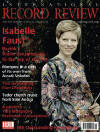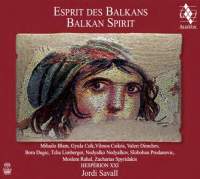Texte paru dans: / Appeared in:
*

International Record Review - (09//2013)
Pour
s'abonner / Subscription information
AliaVox
AVSA9898

7619986398983
Jordi Savall’s musical explorations have in recent years taken him very far from the Western European tradition of ‘early music’, as his collaborations on disc with Turkish and Armenian musicians have beautifully demonstrated. This time he has brought together members of Hespèrion with musicians from the countries of the Balkans — Serbia, Romania, Greece, Turkey, Bulgaria, Macedonia — and different traditions that transcend geographical borders such as the Gypsy and the Kurd.
Much of the music will be very familiar, at least in general stylistic terms (the doina, the kolo, the sousta . . .), if not the specific pieces, to anyone with an interest in the folk music of this region, but the particular mixture here, and the combining of both Eastern and Western musicians in many of the pieces, makes it a unique package. While the cimbalom and the psaltery might be expected, and are brilliantly incorporated into the instrumentarium when appropriate, the presence of the accordion is a real surprise. But the reality is that this ubiquitous instrument has become an indispensable part of many folk traditions, so that it would be foolish to exclude it in search of some long-lost ‘authenticity’.
The triumph of this recording is precisely that it treats the music as real, living music, which is why the folk musicians are there, of course. That Savall’s own group is involved too is a bonus, because it complements and stretches that living quality — placing it in dialogue with Sephardic and Gypsy traditions as well as the ‘art music’ background of Hespèrion XXI — in a way very few other musicians would be able to do. A perfect example is the Greek Ta xyla coupled with the Turkish Çeçen kizi, united by their shared mode (or maqam) and dazzlingly performed by musicians of Spanish, Greek, Bulgarian and Turkish nationality.
It is in fact extremely hard to single out highlights from this dazzling disc, but one track that stays with me is the haunting Zajdi, zajdi by the twentieth-century Serbian composer Aleksandar Sarijevksi. Not only does it employ accordion and organ to splendid effect, but double bass, violin, guitar and the wonderful recorder- like frula.
Also
worth mentioning is the elaborate booklet, replete with information and
magnificent photographs, and translated into the languages of the countries
which have contributed their music and musicians to this remarkable release.
‘Balkan Spirit’ is an apt name, for this is the aural equivalent of
rakija: traditional, stimulating and powerful. Can you resist another
shot?
Fermer la fenêtre/Close window
Cliquez l'un ou l'autre
bouton pour découvrir bien d'autres critiques de CD
Click either button for many other reviews


